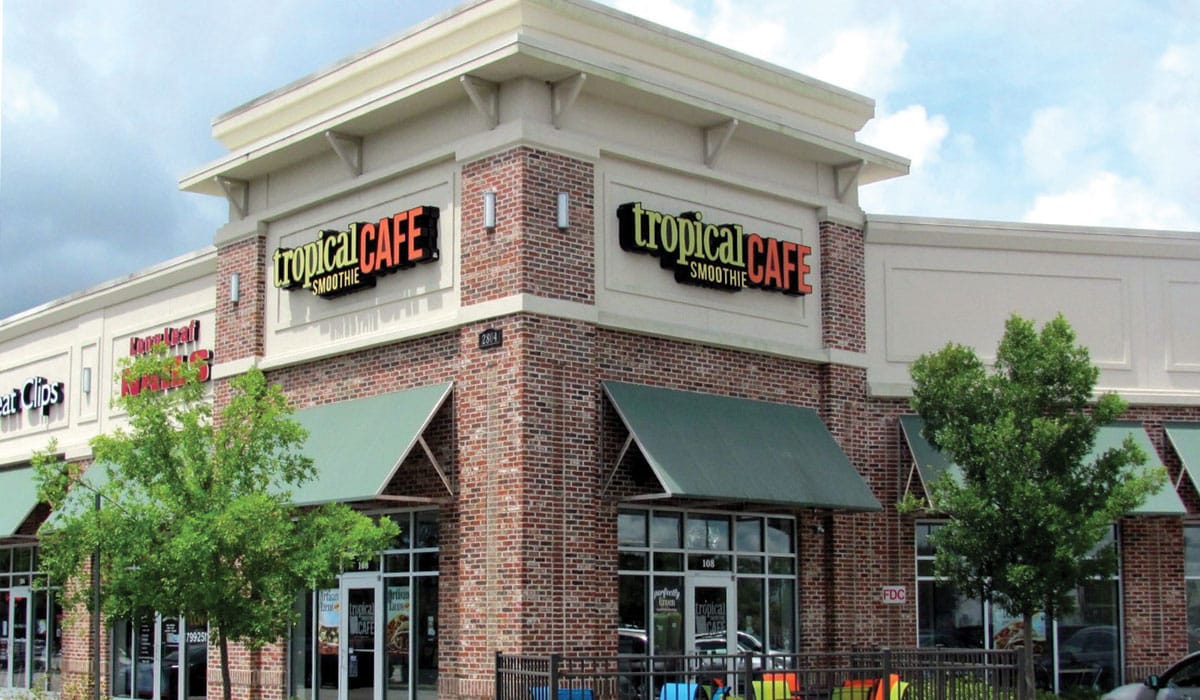When it comes to one of the industry’s hottest trends, Tropical Smoothie Cafe, which recently crossed 1,000 locations, isn’t joining the herd. Ghost kitchens? CEO Charles Watson says they are not a part of the chain’s sizable growth plans.
For Watson, it comes down to the brand’s roots as a franchisee-led organization. Since operators haven’t expressed overwhelming interest to jump in, it’s likely not in the company’s path forward. But the reasons go beyond that.
“I see ghost kitchens, and they perform successfully for a lot of brands. But we’re just a traditional franchise model, and we think that we have a superior method of distributing our products,” Watson says. “We believe brands matter, visibility matters, and connection to the communities where we operate matters. And we think we can do that a lot better through traditional openings.”
The U.S. had 1,500 ghost kitchens in July 2020, according to data from Euromonitor. And that number is only growing. Kitchen United announced it was teaming up with Kroger grocery stores and DoorDash officially launched full-service kitchens, just to name a couple of recent developments.
Watson acknowledges ghost kitchens are a great, low-cost way to test markets and products. After all, the digital space has completely boomed out of the COVID trough, he says. Yet there are niche areas where it makes more sense than others.
“Do I think it has legs? Absolutely,” Watson says. “However, I think it’s with specific brands and in certain geographies.”
Highly populated markets like Los Angeles, New York, Chicago, and Miami present ample opportunities for ghost kitchens, but in the tertiary and secondary markets Tropical Smoothie Cafe often targets, it’s not as clear-cut, Watson says.
He believes the general population is still highly mobile with school, work, and kids’ practices all thrown into the mix, and street corner business remains vital.
“What makes us different is that really big pipeline and that growth and the excitement about the brand and the excitement of communities that want Tropical Smoothie Cafe to open in their community,” Watson says.
Tropical Smoothie Cafe distinguished itself for 25 years based on its confluence of health, convenience, and taste. Even though a main tenet of ghost kitchens for consumers is convenience, Tropical Smoothie Cafe long established its own strategy of offering consumers quick food, whether through ordering options or healthy customizations.
Watson is clear, though: he’s not anti-ghost kitchens. He just doesn’t currently see them in the arc of Tropical Smoothie Cafe’s growth.
Speaking of expansion, it has to be measured and sustainable for franchisee success, Watson says. He has watched other franchise brands explode, opening thousands of locations, and he says it doesn’t always end well.
“Nobody at Tropical Smoothie Cafe gets a paycheck without the hard work that our franchisees do out in the field every day serving their guests and their communities,” Watson says. “So that partnership is so, so key. We’ve got to go ultimately at the pace that we can find great franchisee partners.”
Tropical Smoothie Cafe sold 270 franchises through Q3, and 70 percent were with existing franchisees. That, to Watson, is the greatest restaurant storyline—it shows his existing franchisees are enjoying work, making money in the business, and want to expand even more.
Being on street corners across America helps with brand awareness, but expansion is all a “right place, right time, right franchisee” game, Watson says.
When COVID hit, Tropical Smoothie Cafe wasn’t exactly a beneficiary, but it weathered the storm better than most, he adds. The brand almost reached its goal of opening 120 cafes in 2020 with 99 new units. More striking, Tropical Smoothie Cafe ended the year at 7.5 percent higher in comp sales.
“It was the advent of digital, the advent of third party apps, etc, and being able to stand up all those channels and utilize the technologies that were in the cafes or stand them up to go and capture that business,” Watson says. “Now that infrastructure is in place, that business has been captured, and now it’s about growing it.”
Watson credits franchisees for ultimately powering through a stressful and difficult time, one that continues now with labor and supply chain issues. Job openings saw a high of 10.1 million in July, according to the Bureau of Labor Statistics.
“They’re in there fighting the fight because at the end of the day, remember, this is their business,” Watson says. “This is their livelihood. They’re in there blocking and tackling every day. And I think that’s where a franchise model, especially like ours, can sometimes have some strategic advantage against more of a corporate owned model.”
The grit and determination exhibited by franchisees served the brand well over the past two years, Watson says. Some franchisees opened their first locations more than a decade ago on a shoestring budget and now have 5–10 units.
Watson now expects Tropical Smoothie Cafe to open 150 units next year, up from its 130 goal in 2021 (of which the brand has already debuted 100). Chicago, Dallas, and Houston are prime expansion markets on deck.
By 2024, Watson wants Tropical Smoothie Cafe to reach 1,500 locations with a $1.2 million average-unit volume. He sees no reason why the company can’t get average franchisee profitability well above 20 percent, either.
“It’s all about balancing the growth of the brand with the profitability of the franchisees and driving the brand awareness across the country because a rising tide lifts all boats,” Watson says. “So the more people that know about and love Tropical Smoothie Cafe, from a guest perspective, the better we’ll all do.”









